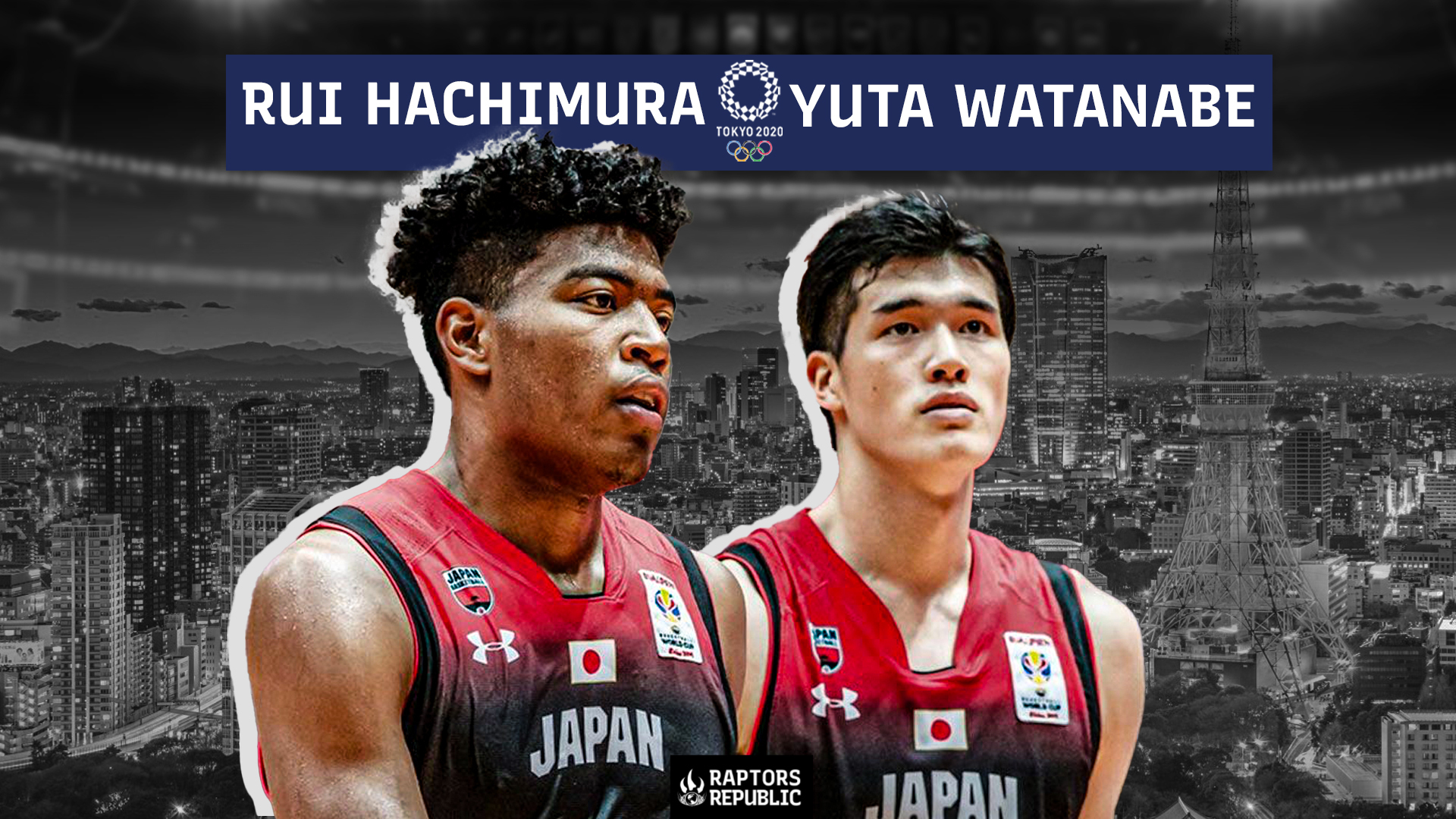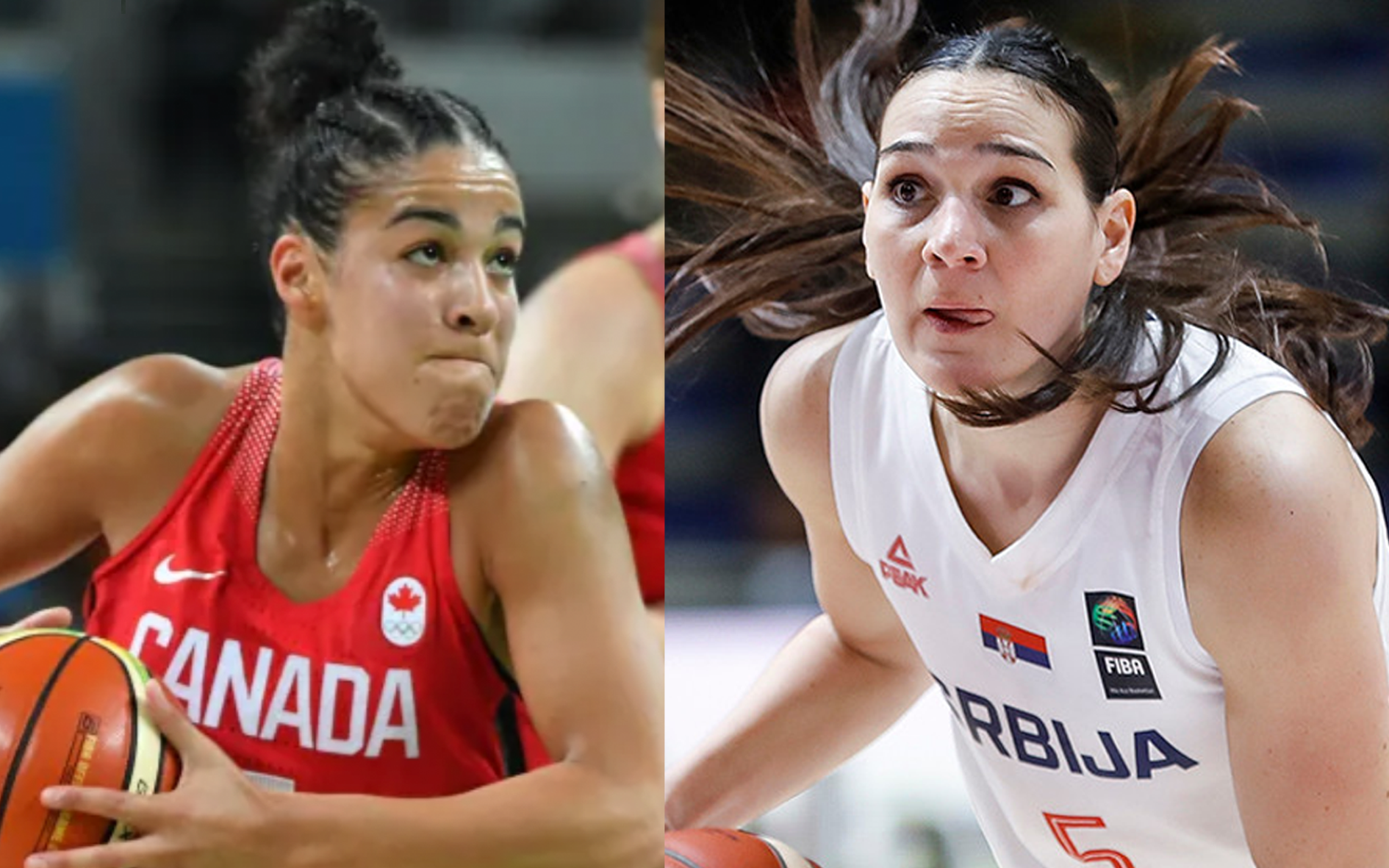This is a guest post from Shotaro Honda Moore, a Japanese sports journalist covering Tokyo 2020.
Yuta Watanabe looks like a keeper in the NBA as a role player. He’s an active rebounder who moves well on defense and isn’t afraid to contest shots, even if it means getting dunked on by rookie of the year candidates. He has decent touch, shooting 40 percent from three and 60 percent at the rim last season, and he knows and is happy to fill his relatively small role.
But with the Tokyo 2020 Olympics ready to begin, Watanabe will have to shoulder a much bigger load for Team Japan along with fellow Japanese NBA player and Washington Wizards forward Rui Hachimura.
Luckily for Watanabe and Hachimura, the expectations for the Japanese men’s basketball team are relatively low. No one expects the lowest-ranked team heading into the Olympics to claim a medal, let alone gold. Instead, fans of the Japanese team are looking simply for a good, entertaining showing. Unlike the United States’ team, which is expected to dominate, Japan is really just looking to compete and prove that they belong.
Watanabe and Hachimura’s success at the Olympics would show that the program is building something sustainable, and in doing so would help contribute to the continued growth of the sport domestically. In fact, Tokyo 2020 could be a truly monumental launching point for the future of hoops in Japan.
Representation In Top Leagues
It is no secret that, throughout the history of basketball, two demographics have dominated the NBA. Those being of course Americans and Europeans. As a result, players of east Asian ethnicity haven’t been very prevalent in the league’s history. Of course, there was the great Yao Ming and the brief shining moment of (Jeremy) Lin-sanity, but for the most part, visible east Asian athletes have not been part of the top-level leagues in the United States or Europe. This lack of representation, while not necessarily dissuading east Asians from pursuing a dream in basketball, most certainly doesn’t inspire confidence that it can be done.
Can you name a Japanese NBA player other than Watanabe or Hachimura? I’ll wait. That’s probably because there have only ever been a handful to make it to the NBA There were also nearly 40 years separating the first Japanese player to be drafted, Yasutaka Okayama (eighth round in 1981), and Rui Hachimura (first round 2019), the most recent Japanese draftee.
Prior to Watanabe and Hachimura, the most prolific Japanese player in the NBA was Yuta Tabuse, who played for the Suns in a brief stint with the team in 2004, appearing in just four games and becoming the first Japanese player to play a minute in the NBA. So, to say the Japanese youth have been missing a role model in the NBA would be an understatement.
Building the sport
While Japan being at the Olympics is certainly a great step towards fostering support in the country, the reality is it was given the spot due to the host nation’s reserved slot. In reality, the Japanese men’s basketball team is ranked 42nd in the world according to FIBA’s rankings and haven’t been to the Olympics since 1976. So, while it’s nice to have this moment, the organizing bodies of basketball in Japan are really looking into how making the Olympics can become the norm rather than the exception. The keys to this will be increasing youth participation and fostering young talent domestically, with avenues to pursue the sport as a profession.
Despite the recent media spotlight Japanese basketball has gotten due to the aforementioned pair of NBA players, basketball participation was actually at its highest in Japan during the 1990’s due to Michael Jordan and the Chicago Bulls’ craze. As it is well documented, Jordan was able to build much of the global success of the NBA and the sport of basketball during his magical runs. Here in Japan, that meant a spike in participation amongst youth and adults alike. However, following Jordan’s retirement, many seemingly lost interest in basketball and, although stars like Kobe Bryant and Lebron James came along, the Japanese fans were never drawn back.
We are not only seeing higher viewership in Japan due to Watanabe and Hachimura, but Japanese companies such as Rakuten and Asics have amped up production of basketball merchandise as of late. We’ve seen this recently with Asics collaborating with young Japanese basketball player Yuki Kawamura, releasing his own shoe. Yuta Watanabe’s jersey was also the most popular basketball jersey sold in Japan this year and Hachimura has signed a shoe deal with Air Jordan and started his own brand, Black Samurai.
While basketball apparel and merchandising is important to grow the sport, especially for casual consumers’ visibility, the success of Japan’s basketball revitalization, spearheaded by Watanabe and Hachimura, will ultimately come down to what kind of domestic systems are in place to grow the Japanese talent. It’s no coincidence that the USA and Spain have top level international teams and the two most financially successful professional leagues.
The B.League
The B.League is the professional league domestically in Japan. It was formed in 2016 with the merger of the independently run bj league and the NBL (the National Basketball League), which was run by FIBA. The two ended up having to join forces due to FIBA putting pressure on organizers by banning Japan from international competition in 2014. While this may seem like a drastic step by FIBA, it ultimately did bring the leagues together to form a stronger domestic entity.
While the B.League isn’t considered a premier league compared to others around the globe, it does offer a liveable wage for players. As such, it has started to garner attention from international talent pools. This is of course necessary to strengthen competition throughout the league, but more important is that many young Japanese basketball players, who may have quit their dreams, are now able to pursue them without having to leave Japan.
We can see this in the composition of Japan’s national team. While some of the Japanese players play in foreign leagues in Australia or the United States, players like Yuki Togashi, Makoto Hiejima and Kosuke Kanamaru all play in the B.League. This shows that these athletes who play in the top domestic league in Japan are already good enough to make Olympic rosters.
With the pair of Watanabe and Hachimura leading the team, who bring with them experience against top-level opponents on a nightly basis, coupled with the home-grown talent, Japan’s Tokyo 2020 roster could be in store for a special showing. Perhaps not by standing on the podium at the end of the Games, but more importantly by laying down the foundation for future generations of Japanese players. This, in the grand scheme of things, could be far more influential than anything Yuta Watanabe and Rui Hachimura do in an NBA game.
Time will tell the ultimate impact of these players representing Japan at Tokyo 2020, but for basketball supporters in Japan, they should be incredibly excited for the endless possibilities.



